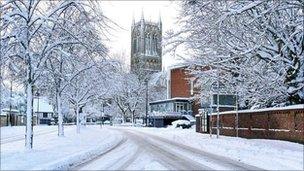Freezing weather disruption continues in Lincolnshire
- Published
Black ice is predicted to cause problems for drivers in Lincolnshire across the weekend.
Lincolnshire police have urged motorists to take extreme care with temperatures as low as -5C (23F) being forecast.
Gritters have now put 10,000 tonnes of salt on the county's roads compared to just 500 tonnes this time last year.
Highways officials said despite there being less snow, lorries were still getting stuck in icy conditions.

Snow has blanketed roads across Lincoln (photo courtesy Steven Stych)
According to the Met Office, Scampton near Gainsborough was the region's coldest place overnight on Thursday, with a low of -13.6C (7.5F)
More than 200 of Lincolnshire's schools were shut on Friday and there were cancellations and revised timetables on East Midlands Trains, with similar problems on Stagecoach buses.
Darrell Redford, from the winter maintenance team, said: "Our crews have been incredible, making back-to-back gritting and ploughing runs on over 3,000km of priority routes and numerous secondary routes as well - day and night, all week long.
'Farmers struggling'
"However, we are seeing temperatures around the -8C mark, which is the point where salt starts to become much less effective, and at -15C it becomes ineffective.
"We can assure motorists that we are treating as many roads as humanly possible and will continue to do so, but this will be having less of an impact."
The authority said it was not concerned about grit stock levels, as it started the winter with 30,000 tonnes and would receive a further 10,000 tonnes in January.
The early snowfall is also causing problems for Lincolnshire's farmers.
John Crest, who has 600 sheep and 4,000 pigs near Washingborough, said the reliability of feed deliveries was being affected.
"My feed comes from Yorkshire or near Ipswich so my main issue is can the lorries get up the A17 and down the A15 to keep the pigs in feed," he said.
"It's critical the pigs have regular feed and regular water, and if you don't have that they will break down with disease and stress and then you have a nightmare on your hands."
He also said that the lack of fresh grass meant hay and beet stocks were being used earlier than anticipated, prompting concerns for farmers about possible shortages later in the winter.
- Published4 December 2010
- Published1 December 2010